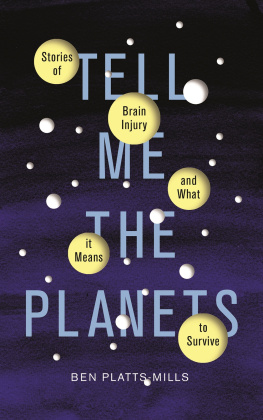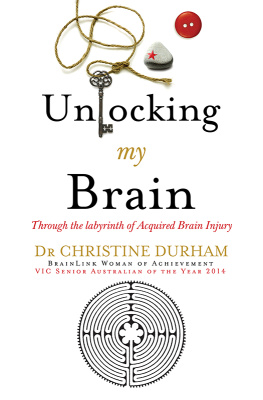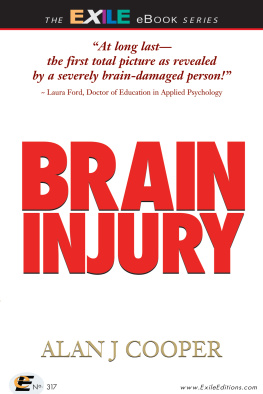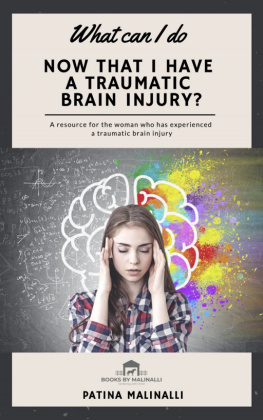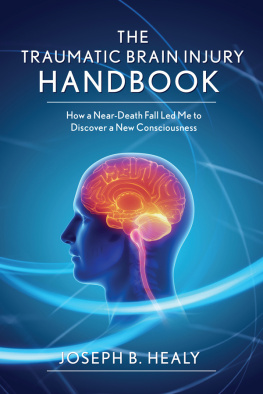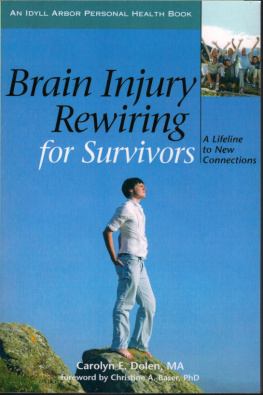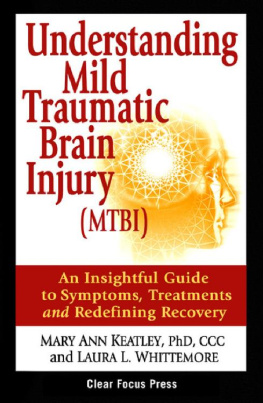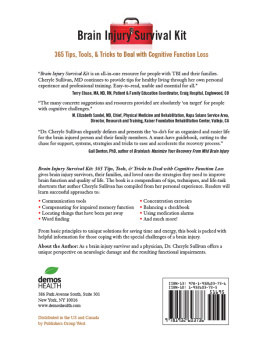Ben Platts-Mills
TELL ME THE PLANETS
Stories of Brain Injury and What It Means to Survive
Acknowledgements
I owe special thanks to my friend Andy Sewell for his patient support over many years, and for saying do that when the idea for this book first came up. For early encouragement and feedback Im also indebted to Juliet Brooke and Kate Murray-Browne. For even earlier encouragement I want to thank Wes White. Im grateful for the efforts of Will Francis, without whom this book wouldnt have existed, and for those of Juliet Annan, without whom it would have been a far lesser thing. I owe Christina Petrie a great professional debt for the rigour and inspiration she brought to Headway East Londons life stories project, Who are You Now?, from which I drew freely in writing this book. What I owe her personally is hard to describe and perhaps impossible to repay but Ill keep trying.
For reading and thinking, my thanks to Natalie Smith, Caroline Pretty, Laura Owens, Ellie Smith, Assallah Tahir and Bryn Davies. For irreplaceable technical and moral assistance: Nora Brennan, Juliet Britton, Will Barker, Ricky Yau and Ernest Aduwa. For being a real friend, Matthew Jones Chesters.
I need to thank Matthew, Danny and Liah, and the other survivors described in this book. Their names, along with some other details, have been changed for the sake of privacy but otherwise they have encouraged me to be bold in telling their stories. For their openness I must also thank the families of those Ive written about, as well as Matthews many wonderful friends for helping me piece together his life before injury. At Headway East London Im obliged to Tony Bonfil and Miriam Lantsbury, not to mention the rest of the team, for supporting this project and for staying with the trouble.
This book is dedicated to everyone at Headway East London and to the memory of Meg Platts-Mills (also known as Maggie Makepeace).
FIG TREE
UK | USA | Canada | Ireland | Australia
India | New Zealand | South Africa
Fig Tree is part of the Penguin Random House group of companies whose addresses can be found at global.penguinrandomhouse.com.
First published 2018
Copyright Ben Platts-Mills, 2018
The moral right of the author has been asserted
Permissions:
by Rachael Tremlett
Cover Design: gray318
ISBN: 978-0-241-97682-1
I paused and flipped through a National Geographic on the table. Tell me the planets, I said, and something about them. Unhesitatingly, confidently, he gave me the planets their names, their discovery, their distance from the sun, their estimated mass, character, and gravity.
What is this? I asked, showing him a photo in the magazine I was holding.
Its the moon, he replied.
No, its not, I answered. Its a picture of the earth taken from the moon.
Doc, youre kidding! Someone wouldve had to get a camera up there!
Naturally.
Hell! Youre joking how the hell would you do that?
Oliver Sacks, The Lost Mariner (1984)
I picture a classroom. Its dimensions are like one I remember from primary school but the light is different reddish and somehow dark, as though the room sits inside a body. It is silent. There is the soft, bitter smell of pencil shavings. I know there would have been others here, but I can only see one person. He sits at his desk, motionless. His head is dark and perfectly round, his small shoulders dressed in a thin white shirt. Moving closer, I kneel at the side of his desk. A ghost here, I watch as he carefully transcribes the statements that have been written on the blackboard into his copybook. And I begin to feel his thoughts. This almost certainly never happened. It is a memory that should not exist. But I believe it to be true.
A person may fly like a bird.
The boy understands that this, like so much at school, is a kind of test. Like other tests, it has the structure of a trap. There is no way, perfectly, to know what is being asked. Humans may certainly fly. The boy knows that he has flown himself that time, as a baby though he does not remember it. But the word like is troublesome, a hard little knot in the string of the sentence. Like a bird may mean many things, only some of which are true when applied to human flight by use of feathers, by flapping, in solitude, without mechanical assistance. But he also knows there is only one way forward: with courage. He writes: Sometimes true.
Snakes are poisonous.
It is 1987. The boy is nine years old. But what this means he cant entirely say. Time, for him, has not yet distinguished itself from change from the coursing of heat through his body, from the fresh custom of waking each day, the happy sting of air on his face and arms. There is, in a sense, no such thing as the boy, as yet. He cannot, yet, himself, be reliably described. When he thinks about a snake, of what are the boys thoughts composed? Nobody knows.
Every question has an answer.
The children around him are quietly working. He sees one boy looking out of the classroom window. There are no answers out there, only earth and sun. Yes, these questions are designed to ensnare but there is something about them he finds seductive. If he is silent, if he treads softly, he can move around each one and observe without disturbing it. There is a space in his mind for this. And he is not made uncomfortable by the quietness required.
The earth moves around the sun.
In each case, he is tempted by twin but opposing rewards: that of answering truthfully, keeping faith with the extent of his own mind, and that of answering correctly, in the manner expected by his teacher. The earth moves around the sun. The answer expected by the teacher here is always true. This is one of those concrete beliefs that schooling rests upon. Like the love of God, the sum of one plus one. But he has read of other things in his fathers books: the ageing of the solar system over millennia, the final collapse of the star at its centre, the engulfing and destruction of the inner planets and the falling away of those at the perimeter. He knows he is taking too long. He may not finish the test. This often happens.
A human may turn into a stone.
It has not occurred to the boy how could it? that there is anything wrong with his hearing. He is aware of an imbalance, certainly. He has looked at his ears in the mirror at home, inserted a finger, cupped his hands to his head in order to funnel the sound of his voice first to one ear, then to the other. The left one seems not to function as the other one does but, he rationalizes, people are either left- or right-handed. Its only natural that they should be left- or right-eared as well. It will be years from now when he is told that most peoples ears are the same.
The leaves must fall from a tree.
Standing next to the boy, forgetting what I know outside this dream, I see that his future is undecided. Anything might happen, nothing can be known. Nevertheless, there are things already in place things that, though they cannot define him entirely, may predispose him to certain kinds of action, or inaction; may with time prove persistent and be confirmed as the characteristics for which he is considered by others to be distinct, vivid, intractable. He is suspicious of his bodily urges, captivated by the patterns of his mind, relentlessly argumentative and pedantic to the point of banality. He is also sensitive, gentle, compassionate, conscientious and fiercely loyal. He has a highly developed sense of justice that can have come not from any teaching but rather only from his own determination of the facts. He is unusually abstract. There are some things that cannot be reduced: he will not be spoken to as a child; he willingly accepts solitude over any kind of compromised companionship. Even as a nine-year-old he is hard-minded.

